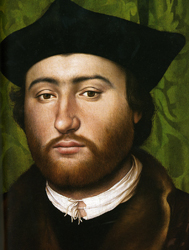

Georges de Selve, born in 1508 or 1509, was a member of a family which had undergone a dramatic rise in social and economic status during the late fifteenth and early sixteenth centuries.* The Selve family is a prime example of the new elite emerging in French society during this period. They had risen from the merchant bourgeois status to become judicial noblesse. While having noble status, they were not fully accepted by the old nobility which based its privilege on birth, landownership, and service as a warrior.
The Selve family were merchants from the Limousin during the fourteenth and fifteenth century. Georges' father, Jean, was the pivotal figure in the dramatic rise of the family's fortunes. Jean, born in 1475, studied law at the university at Toulouse. His first judicial post was as a lay conseiller in the Parlement of Toulouse. In 1505, he became one of the four présidents of the Exchequer of Normandy. He followed this in 1507 with his appointment as the premier président of the Exchequer. By this point he had come to the attention of Louis XII. In 1514, he was one of the French diplomats sent to England to negotiate the marriage between Louis XII and Mary Tudor, the sister of Henry VIII. After the death of Louis at the end of December, 1514, his successor, Francis I, appointed Jean as extraordinary ambassador to England, and at the end of the next year Francis named Jean as the premier président of the Parlement of Bordeaux. With the capture of Milan in the fall of 1515, Francis I named Jean de Selve as vice-chancellor of Milan. In 1520, Francis raised Jean to the highest parlementaire office in France as the premier président of the Parlement of Paris.
Through land acquisition, marriage alliances, and the deliberate choices of careers for his sons, Jean insured the future of the Selve family. Review of the careers of the three eldest sons of Jean de Selve demonstrates how he fashioned his sons to enter the dominant elites of French society. Lazare, the eldest son born in 1503, was destined in inherit the bulk of Jean's estates. He was raised more as a landed seigneur than as the son of a parlementaire official. Lazare was sent by his father to serve as first a page and then valet de chambre ordinaire at the court Francis I. Odet, the second son, followed a career more like his father's. Odet was sent to law school where he received a license en droit civil. He served in the position of conseiller in both the Parlement of Paris (1540-1542) and in the Grand Conseil (1542-1546). On behalf of François I and Henri II, he served as ambassador in England, Venice, and Rome.
Georges, the third son, was destined for a career in the church. He was given a humanist education in Greek and Latin under the supervision of the Pierre Danès. Danès would later be appointed as one of the first professors at the Collège de France. Georges' first position was as a clerc tonsuré of the diocese of Rouen. After being appointed as protonotaire apostolique, he became chanoine in the cathedral church at Chartres. In 1526, at the age of about 16, he was nominated by François I to succeed to the bishopric of Lavaur. This appointment was apparently made by François I as reward for the critical role Jean had played in negotiating the Treaty of Madrid. Georges would not be able to hold this position until he reached the age of twenty-seven, the age stipulated by canon law. Georges' appointment is a good example how the king, through his unprecedented contol over clerical appointments granted by the Concordat of Bologna of 1516, used appointments as a means to gain political allegiances. Of the 129 Frenchmen appointed to the episcopacy by François I, ninety-three of them were members of families from the noblesse d'épée. * Jean would have appreciated how this appointment reinforced the noblesse aspirations of the family. Like his brother Odet, Georges served as an ambassador, representing François I at Venice, Rome, and in Germany.
Georges was a member of the moderate, French reformers in the circle of Lefèvre d'Etaples. The latter dedicated his Psalterium David to Jean de Selve in 1524.* Georges' writings echo the thoughts of Lefèvre. For example, like Lefèvre, Georges places a heavy emphasis on Justification by Faith.